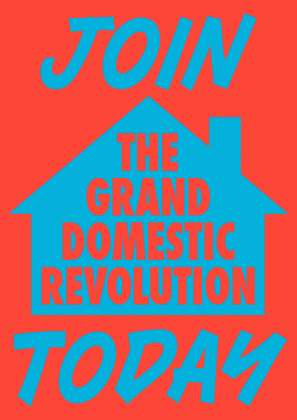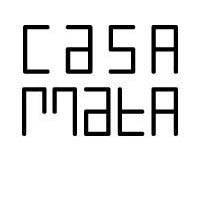|
'Revolution' is no longer just a notion from a bygone era that is periodically resuscitated as a fashion buzzword or in celebration of some technological innovation. The current crisis makes it abundantly clear that the triumph of neoliberalism has not guaranteed a better life for the majority of citizens and non-citizens. Living means struggling with perpetually rising housing rents and mortgage pressure, with the consequences of having work or no work, and anxieties arising from exploitation and self-exploitation. Living is flailing under the constant demand for individualised performance. Living means being locked up in our homes and workplaces, connected mainly through the Internet. Our lives have been distanced from families, friends, colleagues, neighbours and strangers. We want to change this—and that change has to be more than cosmetic.
'The Grand Domestic Revolution—User's Manual' (GDR) is our proposal for taking action and amending our precarious living conditions right here and now, starting from our homes, neighbourhoods and work places, to our towns, cities and beyond. After two years of 'living research' residencies, home productions, town meetings and affinity actions, GDR culminates in an exhibition that aims to share proposals for a grand domestic revolution today. We ask you to join us in our investigation of the conditions and status of the contemporary domestic sphere and in exploring ways of transforming it—building new forms of living and working in common.
Long Live The Grand Domestic Revolution!

The exhibition includes works by:
Agency, Ask! (Actie Schone Kunsten) with Andreas Siekmann, Sepake Angiama & Sam Causer, Pauline Boudry/Renate Lorenz, Doris Denekamp & Arend Groosman, Domestic Workers Netherlands (part of FNV Bondgenoten) with Matthijs de Bruijne, Paul Elliman with Na Kim, Hans van Lunteren and Rob van de Steen, Casco-HKU Creative Lab 'Extended Family', Andrea Francke, 'Our Autonomous Life' with Nazima Kadir, Maria Pask and evolving cooperative cast, Shiu Jin, Mary Kelly with Margaret Harrison and Kay Hunt, kleines postfordistisches Drama, Germaine Koh, Graziela Kunsch, Wietske Maas, Gordon Matta-Clark, Travis Meinolf, Emilio Moreno, Read-in, Martha Rosler, Helke Sander, Kateřina Šedá, Patricia Sousa, Xu Tan, Valerie Tevere & Angel Nevarez, Mirjam Thomann, Mierle Laderman Ukeles, Jort van der Laan, Agnès Varda, Werker Magazine, Vincent Wittenberg, and Haegue Yang.
Spatial design is by Ruth Buchanan and Andreas Müller. Exhibition map and signage is developed by Åbäke.
Themes:
Through the two-year research process, four main themes emerged that have become key lines of thought for engaging the large scope of GDR research and actions.
- Domestic space: housing the commons and living together
- Domestic work: invisible labour and working at home
- Domestic property: struggles between ownership and usership
- Domestic relations: extended families, neighbours versus networks
Locations:
The works themselves perform their positions in dialogue with the exhibition themes across Casco and other venues shared by our neighbours.
1. Casco – Office for Art, Design and Theory, Nieuwekade 213–215, Utrecht www.cascoprojects.org
Casco is transformed into a living and working space, functioning as 'home base' of the exhibition and further actions. It is also where GDR's cooperative sitcom 'Our Autonomous Life?' is produced and screened, and includes space for children and the GDR library.
2. Volksbuurt Museum, Waterstraat 27–29, Utrecht www.volksbuurtmuseum.nl
The Volksbuurt Museum finds its seed in Committee Wijk C, founded in 1974 to preserve and recover the neighbourhood, where Casco is also situated, in response to rapid urban renewal and demolition projects. GDR works are cohabiting with the various documents and objects in this local folks' museum. Annexed as a temporary structure to Volksbuurt Museum is 18b Pavilion consisting of the structural devices installed in the former GDR apartment.
3. De Rooie Rat, Oudegracht 65, Utrecht www.rooierat.nl
De Rooie Rat is the oldest leftist political bookstore in the Netherlands, established in 1974 just up the canal from Casco. Works that call for action mingle with the inspiring books at De Rooie Rat!
Opening hours: Wednesday to Sunday 11.00–17.00 (Sundays at De Rooie Rat, 12.00-17.00)
Occasions:
Watch out for the activities throughout the exhibition, including pilot premiere of the cooperative sitcom 'Our Autonomous Life?', 'Teach-in' by Read-in, 'Kitchen 139' organised by W139, Amsterdam with Casco in conjunction with GDR, 'Assembly (The Grand Domestic Revolution)' by Agency, 'Keywords Cooking School' book launch by Xu Tan, collective futurist fiction writing conference and home schools on GDR Future' (finnissage?). More information is available on our website or GDR wiki.
Exhibition Team:
Curators: Binna Choi & Maiko Tanaka; Curatorial support: Yolande van der Heide; Production: Sofia Evans, Cindy van Rooijen, Suzanne Tiemersma; Production support: Mariska Versantvoort, Marijke de Wal; Construction: Thomas de Kroon, Michael Klinkenberg; Research and PR assistance: Katayoun Arian; Communication design: Julia Born & Laurenz Brunner; General management: Vincent Wijlhuizen.
GDR is made possible with the generous support of Stichting Doen, Gemeente Utrecht, Mondriaan Stichting. Additional support: European Union Culture Programme, K. F. Hein Fonds. Our partners include: De Rooie Rat; Volksbuurt Museum; W139; Dutch Art Institute MFA ArtEZ; HKU Hogeschool voor de Kunsten Utrecht; SKOR | Foundation for Art and Public Domain; RTV Utrecht; Utrecht Manifest: Biennial for Social Design.
|











